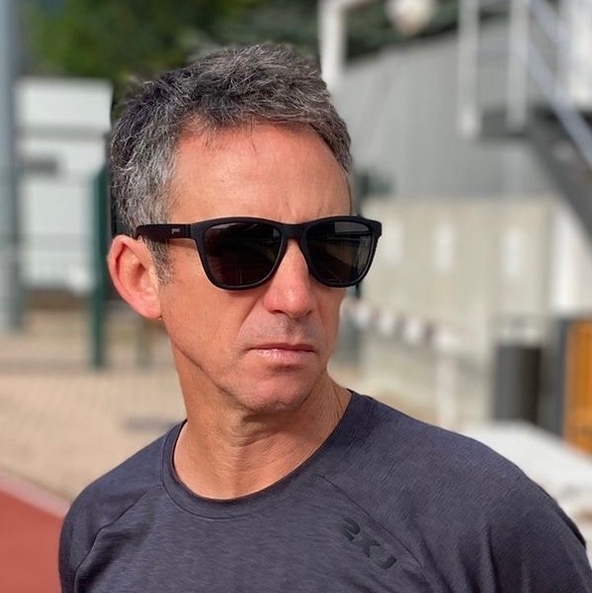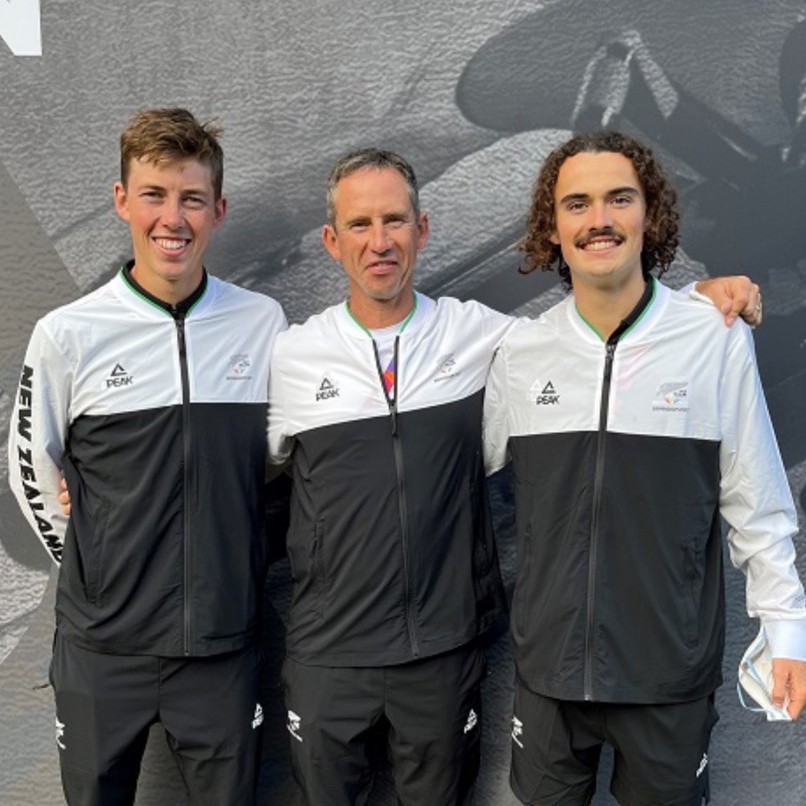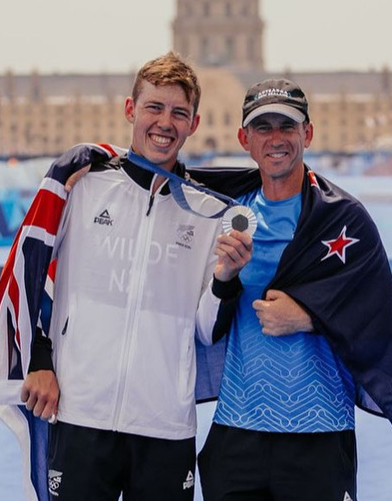Craig Kirkwood
Craig Kirkwood
- Coach Profile
(CK Coaching)
Eleven years after taking a leap of faith, there’s been no looking back for Craig Kirkwood, his expertise in helping two rookies, in particular, transition from aspirants to world-class athletes rubber-stamping his decision.
Taking a circuitous route before making the plunge into fulltime coaching, Kirkwood had a wide-ranging resume across many facets of track, triathlon and endurance running over many years before redundancy forced the issue, resulting in the birth of CK Coaching.
Dealing with athletes from both ends of the performance spectrum, Kirkwood’s philosophy is about helping people thrive and while it’s not always about winning titles, he has, nonetheless, engineered the rising success of his two star pupils, Hayden Wilde and Sam Tanner, who he took under his wing as teenagers.
Returning to New Zealand in 2002 after 10 years of studying, competing and working overseas, Kirkwood had a stint in
an Auckland gym, then was employed in development roles with Athletics Auckland and Athletics New Zealand before he and his family moved to Tauranga where he worked out of sport in a sales role.
“I was doing that for maybe six years until our whole sales division got made redundant and that’s when I decided I was going to coach fulltime, took the plunge, started my business (CK Coaching) in 2013 and went from there,” he said.
“I was mainly doing triathlon stuff at that time, and there was a reasonable demand for age-group triathletes and helping them, so I thought I’d take the plunge and see how it went. I thought that maybe I’d give myself a couple of years and if it wasn’t ticking over nicely, then I’d look for something different.”
“But, it just sort of grew and grew and grew and it’s where I am today, which is in a really privileged position.”
From its formative years, Kirkwood had the dream of coaching an Olympian, 11 years on the founder of CK Coaching has plenty more projects in the pipeline after successfully paving the way for Wilde and Tanner to reach their field of dreams.
“My doors are open to all-comers,” he said. “I’m privileged in the fact that I’m at the point where I can be a little bit selective in who I take on.”
“I coach everything on the track from 800m and I have some ultra-distance runners, who do crazy multi-day races, and then triathletes from Olympic level all the way up to ironman. It’s a big breadth of athletes but it’s fun working with a different variety and you learn a whole bunch of different skills dealing with different people in different events.”

“My passion is really in the development stage as well as high performance, so I really enjoy working with high school kids and then bringing them as far as they can go.”
“When I first started, I thought I’d love to coach an Olympian and now one of my projects is that I want to coach a female Olympian and bring that person right from a young age through to the Olympics.” Wilde has gone on to become one of the leading lights on the world triathlon stage after clinching a silver medal at the 2022 Commonwealth Games in Birmingham. That was followed by a bronze at the Tokyo Olympics in 2021, a string of podium finishes in the Super League Triathlon Championship Series and World Triathlon Series in the last couple of years and the enduring memory of his sportsmanship and silver medal-winning efforts at the recent Paris Olympics.
Middle distance runner Tanner has continued to set personal best times in recent years, becoming New Zealand’s best-ever 1500m runner while going on to compete at the 2022 Commonwealth Games, 2021 Tokyo Olympics and 2024 Paris Olympics.
From track to distance running, triathlon, and ironman, Kirkwood was an accomplished runner in his own right. He competed in the marathon for New Zealand at the 2002 Commonwealth Games in Manchester while also participating in multiple World Mountain Running Championships, World Cross Country Championships, World Ironman Championships, ITU World Long Distance Championships, and ITU Duathlon World Championships.
First competing in endurance sport as a 14-year-old triggered Kirkwood’s delve into coaching, mostly out of necessity, but the skillset and learning more of its intricacies has remained imbedded ever since.
The young Kirkwood took inspiration from the legendary Arthur Lydiard, widely considered one of the outstanding athletics coaches of all time and who presided over New Zealand’s golden era in world track during the 1960s.
“I kind of like to think I started coaching when I first started running. I grew up in Timaru, and I didn’t have a coach, so I self-coached myself right from being a teenager,” Kirkwood said.
“I used Arthur Lydiard’s books as a bit of a guideline to help me with some structure, and that’s when my coaching experience started really. Since then, there’s been a lifetime of learning along the way.
“My foundations in sport were Lydiard and his principles, but I wouldn’t call myself a Lydiard coach. Certainly, the consistency that he brought to training is something that I still stand by today.
“I’ve developed other things in my repertoire that would maybe contradict what he did, but the principle of consistency in training is certainly part of my philosophy. Lydiard was revolutionary in his time, and while training methods have moved on, some of his foundations remain critical.”
From a potential career in designing buildings, a twist of fate while at university inadvertently steered Kirkwood down a different pathway and to his current destination, where he instead designs the formula for New Zealand’s budding track and endurance runners and triathletes.
Heading to the US as an 18-year-old and to the University of Oklahoma on an athletics scholarship in 1993 helped map Kirkwood’s future path.
“I did a Bachelor of Sport Science degree, which fits nicely with where I’ve ended up in my career,” he said.
“When I initially went there, I wanted to do architecture, but all the courses coincided with times that we had to be at the track, so I had to switch degrees early on and ended up doing sports science.”
After finishing his degree in 1998, Kirkwood had intended to return to New Zealand but his father suggested he look at other options while he was overseas.

That prompted a move to London, where he had plans to get a job as an event organiser with the London Marathon. While that fell through, Kirkwood met two key figures who would become major influences on his running career and shape his future direction.
Top British endurance coach Alan Storey became Kirkwood’s coach, pushing him to new levels in the competition arena, while renowned former accomplished runner and coach Kim McDonald, employed the New Zealander as an Athlete Services manager and assistant coach.
“Kim coached quite a few of the Kenyan athletes, so my role was working as assistant coach to him,” Kirkwood said.
“He constantly travelled the world, and I was based in London with the athletes, so I would take them to the track, take them through the workouts and then report back to him based on how they all looked, how they ran, and he would enter athletes into races based on my feedback.”
“That was my initial introduction to high-performance coaching and probably what started me down the career. I probably didn’t realise it at the time, but it was definitely the beginning of high-performance coaching, and I learnt so much during that time.”
Still competing while working in London, Kirkwood made impressive performance gains to qualify for the 2002 Commonwealth Games marathon, returning to New Zealand full-time shortly after when his coaching went on the back burner for the next 10 years.
Kirkwood still dreamed of making the 2008 Beijing Olympics, but when he didn’t, he fulfilled a promise to his brother-in-law by doing an Ironman together. Thus, he began the new challenge of successfully transitioning to competing across multiple endurance events over the next decade.
Kirkwood competed successfully at age-group endurance and triathlon events for several years while juggling his coaching career and still running to keep fit. Now, he particularly enjoys watching the growth of junior athletes.
“You see them develop from a young age and then grow into mature adults and whether they kick on and be professional or just reach their limit,” he said.
“But you see that growth in them, and it’s the same with coaching, like Sam Tanner and Hayden Wilde. I started with both when they were young. Sam was 16 or 17, and Hayden was 18, so seeing them grow from where they were to where they are now and seeing them achieve their goals is really rewarding.”
Major influences during Kirkwood’s eventful odyssey have been those most closely associated with his running career. Both Storey and McDonald played an immeasurable part in his development both on and off the track when based in London.
He is also grateful for the wisdom and advice of former Athletics New Zealand Chief Executive Peter Pfitzinger, who was his coach when he returned home from the UK.
It’s not hard to guess Kirkwood’s career highlights as a coach.
“It has to be Olympic medals which stand at the top,” he said. “I think Hayden’s effort in Paris is probably one of
the most exciting things I’ve ever watched from a coaching perspective, absolutely giving everything he could to try and win that race was pretty cool to watch.”
“And bringing both Sam and Hayden from junior athletes to the Olympics and obviously Hayden winning medals, they’re probably the key things in my career that have been pretty awesome to watch.”
An accredited and registered Athletics NZ coach and Triathlon NZ accredited coach, Kirkwood continually looks at building his coaching repertoire and gaining new knowledge, preferring to take his cues in a more hands-on style.
“You have to grow to continue to be better but I don’t know that formal personal development stuff is always the answer for everyone,” he said.
“I think working with other like-minded coaches, being involved at high-performance events and seeing how others operate and talking with other coaches internationally can be as rewarding and as developing as an organised personal development course.”
Taking the leap of faith into coaching took a while, but Kirkwood couldn’t be happier with where he landed.
“My catch-phrase for a time has been, ‘What I do is better than working for a living’, and I can’t see myself moving away from it anytime soon,” he said.
